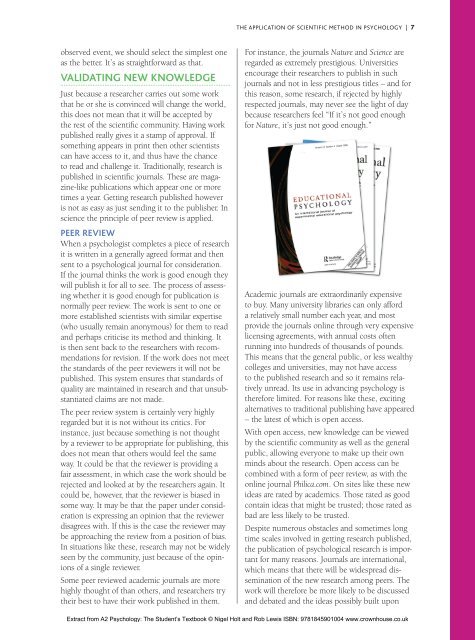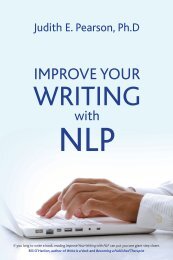Nigel Holt and Rob Lewis - Crown House Publishing.
Nigel Holt and Rob Lewis - Crown House Publishing.
Nigel Holt and Rob Lewis - Crown House Publishing.
You also want an ePaper? Increase the reach of your titles
YUMPU automatically turns print PDFs into web optimized ePapers that Google loves.
the application of scientific mETHOD in PSYCHOLOGY | 7observed event, we should select the simplest oneas the better. It’s as straightforward as that.Validating new knowledgeJust because a researcher carries out some workthat he or she is convinced will change the world,this does not mean that it will be accepted bythe rest of the scientific community. Having workpublished really gives it a stamp of approval. Ifsomething appears in print then other scientistscan have access to it, <strong>and</strong> thus have the chanceto read <strong>and</strong> challenge it. Traditionally, research ispublished in scientific journals. These are magazine-likepublications which appear one or moretimes a year. Getting research published howeveris not as easy as just sending it to the publisher. Inscience the principle of peer review is applied.Peer reviewWhen a psychologist completes a piece of researchit is written in a generally agreed format <strong>and</strong> thensent to a psychological journal for consideration.If the journal thinks the work is good enough theywill publish it for all to see. The process of assessingwhether it is good enough for publication isnormally peer review. The work is sent to one ormore established scientists with similar expertise(who usually remain anonymous) for them to read<strong>and</strong> perhaps criticise its method <strong>and</strong> thinking. Itis then sent back to the researchers with recommendationsfor revision. If the work does not meetthe st<strong>and</strong>ards of the peer reviewers it will not bepublished. This system ensures that st<strong>and</strong>ards ofquality are maintained in research <strong>and</strong> that unsubstantiatedclaims are not made.The peer review system is certainly very highlyregarded but it is not without its critics. Forinstance, just because something is not thoughtby a reviewer to be appropriate for publishing, thisdoes not mean that others would feel the sameway. It could be that the reviewer is providing afair assessment, in which case the work should berejected <strong>and</strong> looked at by the researchers again. Itcould be, however, that the reviewer is biased insome way. It may be that the paper under considerationis expressing an opinion that the reviewerdisagrees with. If this is the case the reviewer maybe approaching the review from a position of bias.In situations like these, research may not be widelyseen by the community, just because of the opinionsof a single reviewer.Some peer reviewed academic journals are morehighly thought of than others, <strong>and</strong> researchers trytheir best to have their work published in them.For instance, the journals Nature <strong>and</strong> Science areregarded as extremely prestigious. Universitiesencourage their researchers to publish in suchjournals <strong>and</strong> not in less prestigious titles – <strong>and</strong> forthis reason, some research, if rejected by highlyrespected journals, may never see the light of daybecause researchers feel “If it’s not good enoughfor Nature, it’s just not good enough.”Academic journals are extraordinarily expensiveto buy. Many university libraries can only afforda relatively small number each year, <strong>and</strong> mostprovide the journals online through very expensivelicensing agreements, with annual costs oftenrunning into hundreds of thous<strong>and</strong>s of pounds.This means that the general public, or less wealthycolleges <strong>and</strong> universities, may not have accessto the published research <strong>and</strong> so it remains relativelyunread. Its use in advancing psychology istherefore limited. For reasons like these, excitingalternatives to traditional publishing have appeared– the latest of which is open access.With open access, new knowledge can be viewedby the scientific community as well as the generalpublic, allowing everyone to make up their ownminds about the research. Open access can becombined with a form of peer review, as with theonline journal Philica.com. On sites like these newideas are rated by academics. Those rated as goodcontain ideas that might be trusted; those rated asbad are less likely to be trusted.Despite numerous obstacles <strong>and</strong> sometimes longtime scales involved in getting research published,the publication of psychological research is importantfor many reasons. Journals are international,which means that there will be widespread disseminationof the new research among peers. Thework will therefore be more likely to be discussed<strong>and</strong> debated <strong>and</strong> the ideas possibly built uponExtract from A2 Psychology: The Student’s Textbook © <strong>Nigel</strong> <strong>Holt</strong> <strong>and</strong> <strong>Rob</strong> <strong>Lewis</strong> ISBN: 9781845901004 www.crownhouse.co.uk

















